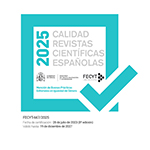Nuevos estudios de infancia, política de infancia y derechos de los niños y niñas
Resumen
En un momento en que el futuro de la democracia está en juego, es necesario reconocer la importancia de la contribución que los "nuevos" estudios de la infancia pueden hacer para asegurar ese futuro, particularmente con respecto a establecer la importancia de la agencia y la competencia social de los niños (en diferentes ámbitos de la vida cotidiana) como actores sociales políticos. La combinación de estos reconocimientos con la tarea de conceptualizar las políticas de infancia (en forma de políticas con niños) y un desarrollo emancipador en el campo de los derechos del niño es vital para unos debates socio-teóricos y socio-políticos más completos sobre las soluciones al problema de un futuro humano positivo para todas las generaciones. En este artículo mostramos cómo las conceptualizaciones y el trabajo empírico de los estudios de infancia realzan el papel que los derechos de los niños pueden desempeñar en la mejora de los procesos democráticos en el nivel de la sociedad, es decir, en la participación real. Esto va más allá de la tendencia a tratar los derechos de los niños como una cuestión de interés individual, en su lugar se aboga por una consideración de los derechos y de la agencia de los niños como una condición social para la democracia.Descargas
Descarga artículo
Licencia
La revista Sociedad e Infancias, para fomentar el intercambio global del conocimiento, facilita el acceso sin restricciones a sus contenidos desde el momento de su publicación en la presente edición electrónica, y por eso es una revista de acceso abierto. Los originales publicados en esta revista son propiedad de la Universidad Complutense de Madrid y es obligatorio citar su procedencia en cualquier reproducción total o parcial. Todos los contenidos se distribuyen bajo una licencia de uso y distribución Creative Commons Reconocimiento 4.0 (CC BY 4.0). Esta circunstancia ha de hacerse constar expresamente de esta forma cuando sea necesario. Puede consultar la versión informativa y el texto legal de la licencia.










